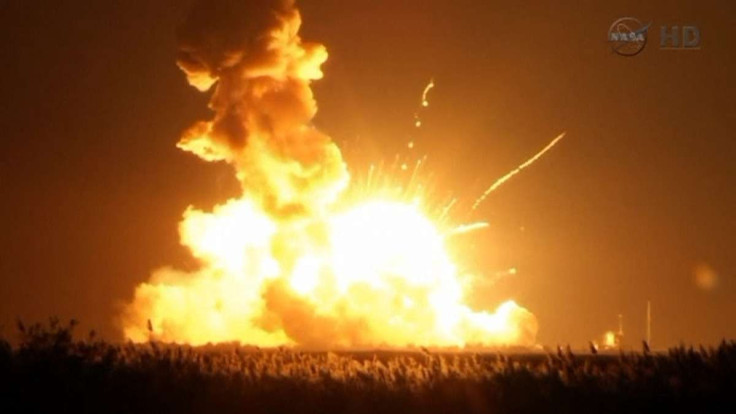Rocket Explosion Leaves NASA With Only One Commercial Supplier To ISS As Russia Launches Resupply Ship

After an Antares rocket exploded Tuesday leaving NASA with only one vehicle capable of delivering cargo to the International Space Station, or ISS, Russia has offered to assist the United States with deliveries to the orbiting lab. NASA has said that the ISS crew is not at risk of running out of supplies.
On Tuesday, an Orbital Sciences Antares rocket exploded seconds after it was launched from NASA's Mid-Atlantic Regional Spaceport in Wallops Island, Virginia. While the rocket’s failure left SpaceX as the only U.S. company capable of flying cargo to the ISS for now, Russia, which successfully launched one of its own supply ships on Wednesday, said it is ready to help the U.S. if the country asks for it, Agence France-Presse, or AFP, reported.
“If a request is made for the urgent delivery of any American supplies to the ISS with the help of our vessels then we will fulfil the request,” Alexei Krasnov, a Russian space agency official, told state-run RIA Novosti news agency.
Krasnov’s statement coincided with the launch of Russia’s own supply mission Wednesday, when a Russian Soyuz 2-1A rocket with the latest Progress resupply vehicle (M-25M) lifted off from the Baikonur Cosmodrome in Kazakhstan for a six-hour trip to the ISS.
This resupply vehicle carried 2,866 pounds of dry cargo; 926 pounds of water in Rodnik tanks; 1,940 pounds of mid-section propellant; and 551 pounds of PolyAcetylOzone, or PAO, propellant for the ISS, NASASpaceflight.com reported.
NASA, which has neither asked for assistance nor responded to Russia’s offer so far, said that the agency would make another launch attempt after looking for the problem that caused the “mishap.”
“While NASA is disappointed that Orbital Sciences' third contracted resupply mission to the International Space Station was not successful today, we will continue to move forward toward the next attempt once we fully understand today's mishap. The crew of the International Space Station is in no danger of running out of food or other critical supplies,” William Gerstenmaier, associate administrator of NASA’s Human Exploration and Operations Directorate, said in a statement.
While the failed Antares rocket was Orbital's third of eight missions under a $1.9 billion NASA resupply contract, SpaceX recently completed its fourth successful resupply run under a $1.6 billion contract.
SpaceX, a Hawthorne, California-based space transport services company, is scheduled to launch its next cargo ship to the space station from Cape Canaveral, Florida, on Dec. 9, USA Today reported.
“Today's launch attempt will not deter us from our work to expand our already successful capability to launch cargo from American shores to the International Space Station,” Gerstenmaiern said.
© Copyright IBTimes 2025. All rights reserved.






















